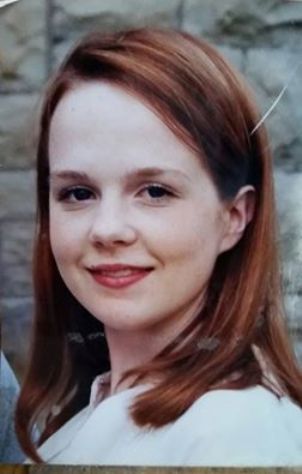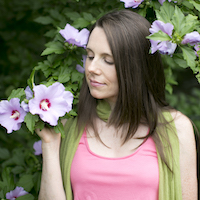I learned early on to love hating my body. I learned that looks matter—and that being good enough was something that didn’t come from the inside.
My mother would constantly ask me: “Do I look fat?” Her wounds bled through her daily dialogue. Children notice things—grimaces in the mirror; eye rolls at reflections; hours spent trying on different outfits in an attempt to look as slim as that critical voice in our head wants us to.
Those things left a mark on my sister and me—a deep one.
My sister and I, like many teens, spent years counting calories. I chose not to eat; my sister chose to binge and purge. It wasn’t pretty. It was a silent battle that left its mark in the circles under our eyes and waif-like thinness of our thighs. There was no turning back once we went down that road—not right away, at least.
My sister didn’t make it back from that road. She died at the age of 20 from a grand mal seizure induced by trying ecstasy for the second time. Rebecca, my sister now in spirit, struggled for years with anorexia-bulimia. The autopsy revealed that she had the bones of a 50-year-old.
She was killing herself. The doctors told my parents that her electrolytes were so off from the purging that they contributed to the seizure. Her eating disorder played a role in her death. And, they said, it would have taken her life eventually—even if the ecstasy hadn’t.
This was a wake-up call to me. I woke up to the fact that life is short and life is sacred. I began to eat like a normal human being. My calorie-counting stopped, and my weight went into the healthy range for my height and stature.
Eating became a sort of ritual to honor my sister. I was taking in calories for her too. I was gaining flesh to support her life through mine. We were one. There was a connection between us that was even stronger in spirit. We were 18 months apart and always too close for comfort growing up. After she left her body, I knew why: I felt her pain—it was one with my own. We both grew up thinking our bodies were a battlefield meant to be beaten, battered and verbally abused. We were in it together—for the long haul. And when that long haul ended shortly for Rebecca, I was head-spinny and sad. I was lost, alone and confused.
And in the deep sorrowful pit of my grief, I found my body love.
I had a dream where my sister was throwing up on her favorite shirt, looking at me with terror-filled eyes—her spirit calling to mine for help. I inherited that shirt. I took it and went to Kripalu for a week-long karma yoga program. I cleaned toilets and cried for her. I cleaned and scrubbed bowls upon bowls that she puked in all those years. I ate vegan and did yoga and learned to love my body in Rebecca’s clothes. I loved and loved my body until there were no more toilet bowls to scrub. I left Kripalu renewed. The haunting dreams stopped. My self-love was her cure.
I went home and kept doing yoga. I had her mat. It had heel marks in it—from her digging and pushing and trying to get somewhere. I decided to let go of that mat and get one of my own. There was no need to push anymore. I rolled out my new mat, stepped onto it and took a deep breath. My step was light. I felt a light hand on my right shoulder and I stretched my arms up overhead.
This is for us, she said to me, and my arms stretched up higher—so high, I felt light, light on my feet, like an angel. For a moment my body was gone, then my breath came back. I opened my eyes. My teacher was there, gently guiding my arms down with a soft, warm smile.
“And swan dive forward,” he said, winking. Back in the moment. My body, My breath.
~
We are taught to hate. We are taught to entertain the hateful thoughts—the I have chubby thighs, a crooked nose, wrinkles around my eyes, stubby knees thoughts—over the positive ones.
I have a grand proposition: entertain the good thoughts, and ask the bad ones to leave the party.
I ask the clients and students I work with on body-love to start with at least one thing they love about their body.
We can all think of at least one!
I started with my eyes. I’ve always loved my crystal blue eyes. If my whole body vanished and all I was left with were my eyes, I’d be a happy soul. Once I started with my eyes, I was able to go further. I love my freckles and my creamy white skin and the way it gets pink in the sun. I love my hair—the color, texture and the fact that it grows so fast. And the list goes on.
I still have critical thoughts. But when I do, I reset with a positive thought. On a tired day, when I notice the lines around my eyes looking deep, I cringe at my reflection. After the cringe, I automatically notice the blue of my eyes. The blue brings me back to that loving, positive place.
“Love yourself,” my sister’s voice says to me in those moments. “Love yourself, Sarah—for me.”
If you’ve struggled with an eating disorder or body perfection, it takes ongoing work—lifelong work, to continue to love and appreciate all that you are—body, mind and heart.
The body is fleeting. My sister’s body—the one that she fought with so hard—no longer exists. But her spirit lives on. The memory of her light, sparkly, thespian self lives on in the minds and heart of all those she touched—and now in you, the reader.
My sister’s spirit is my self-love teacher. My daughter is too. As my daughter and I play the “What do I love about my body game,” she learns to appreciate her perfect imperfectness. I mention I love my pointy nose, and that I didn’t used to. I’m honest with her about the state of the mind—the wishy-washy, sometimes good and sometimes bad thoughts that flow through. “I love my earlobes,” my daughter says. “I love how soft they are. And I love the skin on my neck and my baby toes.” I smile. “That’s wonderful,” I say.
As she sees me smile at my reflection, she learns it’s not something to fight, but something to love. I often see her smiling at hers or making goofy faces and exploring the myriad of ways she can contort her cute lips into silly and scary faces to make me laugh.
There are still times when I feel bloated or sick and I complain about my body. But I do it with love. I tell my little five-year-old: “Mommy’s feeling sick right now, so being in my body doesn’t feel so good—but I know it’s just temporary.” She nods and goes about playing with her toys. Sometimes she offers to rub my earlobes—something she finds very relaxing to receive and to give. Those little love gestures always make me melt—and when I melt, my body hate melts too!
Recap: How to Love your Body More.
>> Find that one part of your body you love. Start there. Use that as your totem for the transformation process to start.
>> Each time you have a critical thought, come back to the one part you love. Appreciate it with just a thought or even a smile. Thank it. As you start with one part, you may be able to find other parts.
>> Body Gratitude: Thank life for your body—the ability to be able to breathe and experience this gift of life. Gratitude is the best way to begin to shift to a positive mindset. Gratitude literally sends endorphins to the brain.
>> Look at your reflection and say, “I love you.” Do it even if it’s hard. Make eye contact with yourself. Do it even if it feels fake. Continued practice makes it real.
>> Patience: It takes 21 days to change a habit. Time is truly the healer of all wounds. So, don’t give up on yourself. Commit to yourself. You’re worth it.
I don’t wish anyone a sudden death to experience what it is to love their body and appreciate their life. I hope my wake-up call can help you. And if you are suffering from an eating disorder, please don’t suffer in silence. Get help! Professional support is out there. My sister and I both had treatment for ours—even though we still had a ways to go for full recovery. Here is a list of resources, to get started.
Life is so sacred. Your body is a temple. Honor it. Love it. Enjoy it. We are here in the flesh to experience the delights only those in bodies can enjoy.
Author: Sarah Lamb
Image: Public Domain
Editors: Emily Bartran; Toby Israel
 Share on bsky
Share on bsky





Read 1 comment and reply